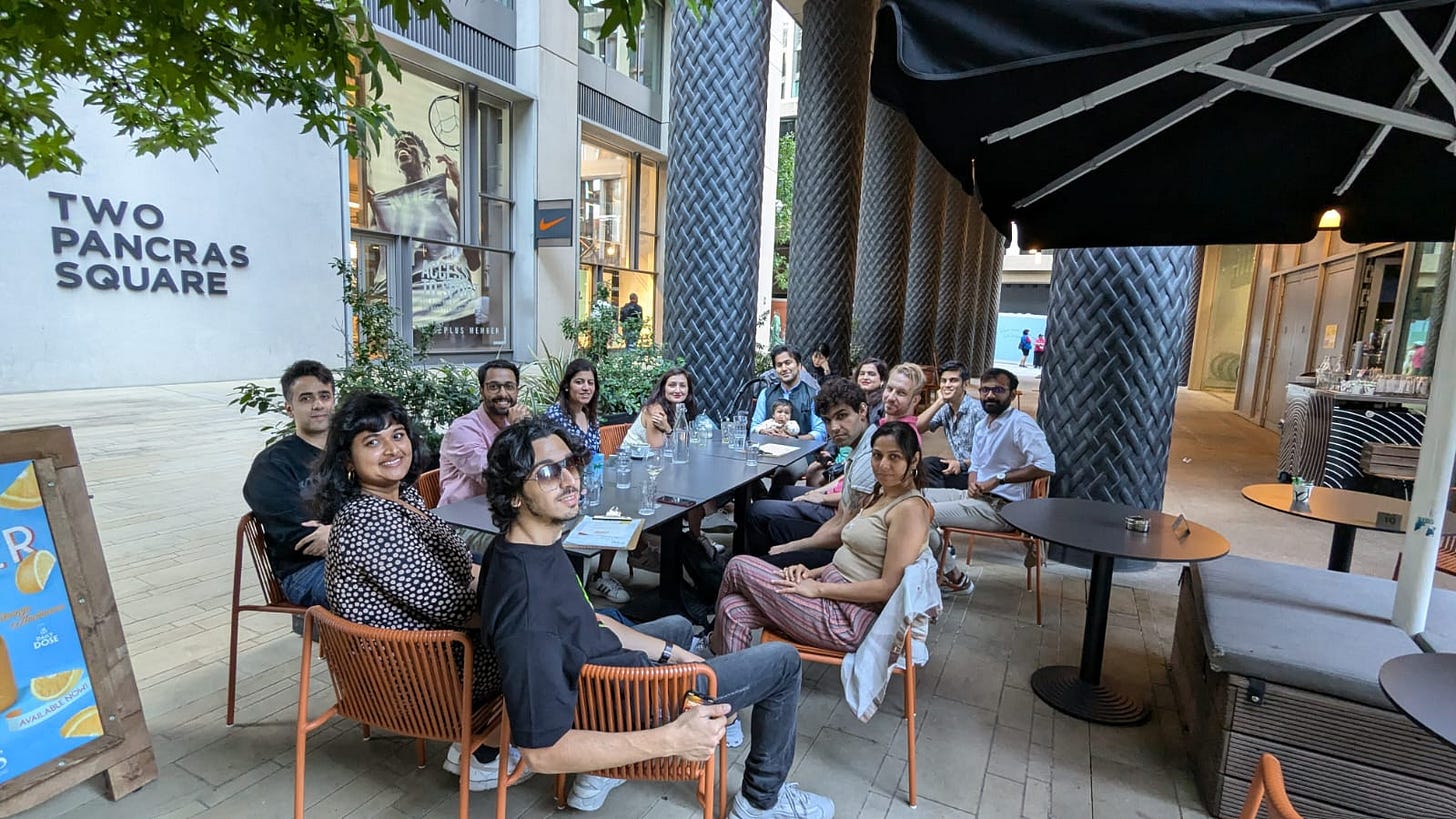Masterclass: Sanjay Nayar (Ex-KKR, Sorin Investments), Sam Altman on Success, Scott Adams on Writing, Alex Danco on Learning on the Job
Event invite and reading guide for the weekend
Happy Sunday everyone,
We are pleased to share that Sanjay Nayar (KKR, Sorin Investments) will be with us on August 15, 430 pm UAE time. Subscribers can join live and ask questions.
When we invite inspiring leaders to Network Capital, our goal is not to leave you with a “how-to” formula. Instead, we hope that listening to them and engaging with them will help you apply their problem-solving frameworks to your work life.
Our community members met in London to discuss important issues about the intersection of geopolitics and tech. We also had a special guest. See if you can spot her.
You can attend such events all around the world and scale your network by joining NC.
#1.
Sam Altman outlines 13 key points in his blog post "How To Be Successful." It is worth reading in full but if you are short on time, take a look the summary below.
1. Compound yourself: Focus on exponential growth in your career and projects, aiming for long-term compounding effects.
2. Have almost too much self-belief: Cultivate strong self-belief, balancing it with self-awareness to avoid delusion.
3. Learn to think independently: Develop original thinking skills and test ideas in the real world.
4. Get good at “sales”: Master the art of persuasion and communication to effectively sell your ideas and vision.
5. Make it easy to take risks: Embrace risk-taking by creating conditions that allow for experimentation and adaptation.
6. Focus: Concentrate on the most important tasks and priorities to maximize effectiveness.
7. Work hard: Achieve success by combining hard work with smart strategies, especially early in your career.
8. Be bold: Pursue ambitious projects and let curiosity guide your efforts.
9. Be willful: Persistently pursue your goals, bending the world to your will when necessary.
10. Be hard to compete with: Build leverage through unique skills, relationships, and personal branding to become difficult to replace.
11. Build a network: Cultivate a strong network of talented and ambitious people who can support and collaborate with you.
12. You get rich by owning things: Focus on owning equity in businesses or projects, rather than just earning a salary.
13. Be internally driven: Rely on your own motivation and goals rather than external validation or incentives.
#2.
If you are new to a job, read this fantastic essay by Alex Danco’s where he talks about his early days at Shopify.
“What are other situations where you can – in a compressed way – practice these skills that you need in the business world? I make strategic decisions, for my job at the company. For most of these strategic decisions, I hope I do well, but I only find out a couple years later. The way I’m doing them is I try to get as much context as I can, and resolve this big multi-stakeholder situation, plus technical abilities, plus future timelines, plus the way the internet will go… How often do I do this in a year? A couple times, maybe once a month? I don’t think so. Major opportunities to bet the company and allocate resources don’t come around that often.”
#3.
"The Day You Became a Better Writer" | Scott Adams
"I went from being a bad writer to a good writer after taking a one-day course in 'business writing.' I couldn’t believe how simple it was. I’ll tell you the main tricks here so you don’t have to waste a day in class.
Business writing is about clarity and persuasion. The main technique is keeping things simple. Simple writing is persuasive. A good argument in five sentences will sway more people than a brilliant argument in a hundred sentences. Don’t fight it.
Simple means getting rid of extra words. Don’t write, 'He was very happy' when you can write 'He was happy.' You think the word 'very' adds something. It doesn’t. Prune your sentences.
Humor writing is a lot like business writing. It needs to be simple. The main difference is in the choice of words. For humor, don’t say 'drink' when you can say 'swill.'
Your first sentence needs to grab the reader. Go back and read my first sentence to this post. I rewrote it a dozen times. It makes you curious. That’s the key.
Write short sentences. Avoid putting multiple thoughts in one sentence. Readers aren’t as smart as you’d think.
Learn how brains organize ideas. Readers comprehend 'the boy hit the ball' quicker than 'the ball was hit by the boy.' Both sentences mean the same, but it’s easier to imagine the object (the boy) before the action (the hitting). All brains work that way. (Notice I didn’t say, 'That is the way all brains work'?)
That’s it. You just learned 80% of the rules of good writing. You’re welcome."
#4.
For more on writing, refer to these newsletters
#5.
A debate about university politics


